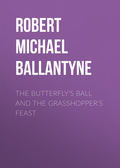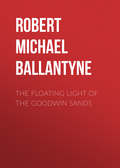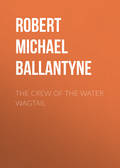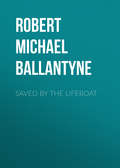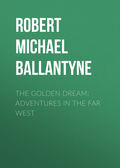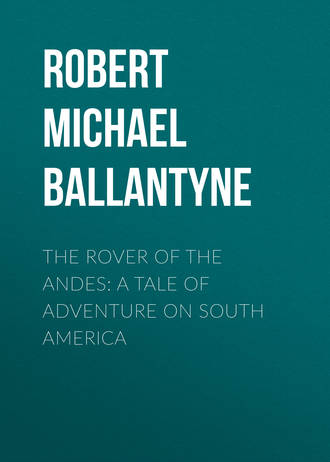
Robert Michael Ballantyne
The Rover of the Andes: A Tale of Adventure on South America
Chapter Twenty Four.
Lawrence and his Man fall in with Strangers, hear Good News, and experience Rough Usage
“Lost on the Pampas!” thought Lawrence, on awaking next morning. It was romantic, no doubt, but—well, he did not follow up the “but” with very definite conceptions.
As he lifted his eyes towards the horizon, where the rays of the rising sun were suffusing the sky with a tinge of rosy light, his first feelings partook of gratitude for a night of unbroken rest, which had restored a bounding sensation of physical life and strength and energy. Awaking in such a condition of mind and body leads one, contradictory though it may seem, to spend the first few minutes of reviving consciousness in restful contemplation and enjoyment of one’s surroundings. Raising himself on one elbow, our hero let his eyes wander dreamily over the vast plain. There was much monotony about it, no doubt, but the majesty of illimitable space neutralised that impression. On the horizon the intensifying tone of the rapidly increasing light harmonised with the varying greens and yellows of the herbage. Here and there one or two uplands in the far distance caught the sheen of day and relieved the prospect with streaks of varied hue. Still nearer a few clumps of low shrubbery increased this diversity a little. In the middle-distance the varied colours and forms of the grasses became distinct enough to invest the scene with character, while in the immediate foreground additional force and interest were given to the landscape by the person of Quashy lying flat on his back, with his great eyes closed and his huge mouth open.
The state of dreamy contemplation did not last long. The stern realities of the situation seemed to rush in upon his mind with sudden power. Lost! lost! The captives perhaps still unrescued from the savages! Manuela in danger! It was a dreadful state of things.
“Come, Quashy!” cried Lawrence, leaping up and giving the negro a rough shake that brought him instantly to a sitting and blinking condition. “Get up. We must be off. Saddle the horses—the hor— why, where are the horses?”
He finished the sentence in tones of anxiety, for no horses were visible.
Bounding into the patch of bushes, on the edge of which they had passed the night, Lawrence ran through it hastily, followed by his man, who had shaken off lethargy in a moment.
The patch was small. Moreover, the shrubs were barely tall enough to conceal a horse. In five minutes it became quite certain that the horses were not there.
From the highest point of the rising ground they had a clear view of the plains all round, but after the keenest scrutiny not a speck resembling a horse was to be seen. The searchers looked at each other in dismay.
“Lost! and our horses gone!” said Lawrence, in a voice which excess of alarm had reduced to a sort of low, hoarse whisper.
“Most awrful!” murmured Quashy.
Lawrence cleared his throat and paused, while his sympathetic servant gazed.
“Now, Quashy,” he said, “it seems to me quite impossible that our animals could have strayed in a few hours quite out of such an enormous circle of vision. They must be somewhere about, though we can’t see them.”
“Yes, massa, dey must be somewhar, as you say.”
“Well, then, it follows that they must be concealed in one of the few clumps of bushes that lie around us. So we must search these instantly, for our only hope lies in finding the horses.”
“Das so, massa.”
Even our negro’s elastic spirit seemed to be subdued to some extent by the prospect before them; for, apart from the fact that the bushy islets in the grassy sea were scarcely high enough to entirely conceal so large an object as a horse, they were scattered about at such immense distances from each other that a complete search of them implied toilsome labour for at least the whole of that day. Lawrence felt, however, that it had to be done, and arranged that his man should search towards the east, while he should take the west. To prevent the risk of their losing the mound on which they stood, one of their ponchos was thrown over the top of the highest bush and fixed there as a signal. So eager were they to begin, that both started off without a thought of breakfast.
It is not necessary to follow the steps of each. In regard to Lawrence, it may suffice to say that he wandered during the whole of that sultry day over the boundless plain, wearily but persistently examining the few bush-islets that lay to the west of their bivouac without finding a trace of the lost steeds. As the sun began to decline towards the east he gave up in despair, and, with weary limbs and something like wolfish hunger, returned towards the rendezvous.
Very different had been the experience of his sable servant.
Starting off, as we have said, at the same time with his master, Quashy found the two horses, after a two hours’ search, quietly grazing in a grassy hollow. A low shrub-covered mound lying close to this hollow intervened between it and the spot where our adventurers had spent the night, thus effectually concealing the lost steeds from view.
The instant Quashy made the discovery he ran to the nearest elevation on the plain with the intention of shouting the news to his master, but by that time Lawrence was two or three miles away on the other side of the bivouac, quite beyond the range of sight and hearing.
Quashy, therefore, ran back to the hollow with the intention of catching the horses, mounting his own, and driving the other before him to the camp.
And now began that interesting but somewhat exhausting and heart-breaking process which may be styled coquetting with a free horse.
Full of glad enthusiasm, the negro ran towards his own steed, holding out his right hand, and exclaiming, “Come along, Ole Scrubby.”
He had named the horse Ole Scrubby owing to some sort of facetious perversity of his own temperament, for the horse, instead of being “ole,” was quite young, and, far from being scrubby, it was a remarkably fine animal.
“Come now, Ole Scrubby,” repeated the man, “we’s got no time to waste. D’ee hear?”
Evidently it heard, for, after allowing its master to advance within three feet of it, and even putting out its nose to smell his black hand, it gave a snort, turned round, tossed up its heels, and trotted away. Stopping short suddenly it turned again and looked at its master with a high head, as if to say, “There! what think you of that?”
“You ole scoundril,” growled the negro, with an injured look, “di’n’t I say we’s got no time to waste? eh! Come, now. Das enuff o’ your fun.”
He had again approached to within three feet or so, and again the playful steed had protruded its nose and even touched his hand, but before that hand could grasp the halter, tail and heels were in the air, and away it went a second time.
Indignation, intensified to the uttermost, sat on Quashy’s countenance. “Scrubs,” he said, solemnly—modifying the name a little, as he became more serious—“you nebber doo’d dat before! Come, sar, you ’bey orders, an’ stan’ still.”
But the horse refused to obey orders, and declined to stand still. His master began to lose temper—if we may so speak of one who only became a little less amiable than usual. Under the influence of the condition, however, whatever it was, he became unjust, and began to call his horse names.
“What! you not ’bey orders? you ole screw—you unnat’ral villin—you obs’nit lump o’ hoss-flesh! Stan’ still, I say!”
Need we say that the horse refused to stand still?
Again, and again, and over again, the negro tried to lay hands on the animal, and as often did he fail. Quashy, however, was not to be easily beaten. His was a resolute and persevering nature; but the misfortune on that occasion was that he had to do with a creature possessed of greater resolution and perseverance than himself. He spent hours over the effort. He coaxed the horse. He wheedled it. He remonstrated with and reproved it. He tried the effect of the most endearing entreaties, and assurances of personal esteem. Losing—no, becoming less amiable, he flew round to the other extreme, and accused it of ingratitude, indefensible even in an ass. Then he sought to bribe it with offers of free forgiveness. After that he tried to frighten it with threats of the most painful and every way horrible consequences; but whatever effect all these varied influences might have had upon the horse’s mind, the one unvarying effect on its body was to send its tail and heels towards the sky, while it neighed joyously and trotted around. Poor Quashy went up to it smilingly—after that, frowningly; he cringed towards it; he advanced straightforwardly; he sidled slily; he ran at it; he rushed at it; he bounced at it; he yelled at it; he groaned at it; he perspired after it; he went nearly mad over it, and, finally, he sat down before it, and glared in deadly silence in its innocent face!
Then the unfortunate man, having spent a very considerable part of the day thus, bethought him of trying to catch the other horse, but with it he was also unsuccessful—indeed, the failure was even more emphatic, for Lawrence’s steed refused to let him come within even hopeful distance of it.
At last, in the profoundest state of despair to which he was ever known to have sunk, he returned to camp. Lawrence had got there before him, saw him coming, and advanced to meet him.
“Well, Quashy, I have failed,” he said, with a sigh.
“So’s I,” returned Quashy, with a growl.
“This losing of our horses,” remarked Lawrence, “is the worst that could have befallen us.”
“No, massa,” said the negro, with more of sulkiness—or less of amiability—than he had exhibited since they first met on the western side of the Andes, “breakin’ our legs would be wuss—smashin’ our necks would be wusser still. But de hosses is not lost. Dey’s on’y spunkerblued.”
“How? What d’you mean?”
“Dey’s down dar,” returned the negro, pointing with his finger, “down in dat holler—spunkerblued.”
“Not killed, I hope,” asked Lawrence, anxiously.
“Oh no, massa, on’y spunkerblued—stuffed to de muzzle wid deir own self-will.”
Lawrence received this explanation with a light laugh. “Come,” he said, quickly, “lead the way, Quash, and I’ll show you how to get them out of the spunkerblues.”
Comforted and reassured by his master’s hearty tone and manner, the negro led the way to the spot where he had spent such a busy day.
Now, we do not know whether we have made it obvious to the reader that Lawrence Armstrong’s kindliness of nature embraced not only the human race but the whole animal kingdom. At all events it is true that wherever he came in contact with the lower animals he managed by some species of fascination to gain their affections. The mode of fascination began, no doubt, with their stomachs, but this does not alter the fact. Among other creatures Lawrence had gained the affections of Quashy’s steed, and also of Manuela’s and Pedro’s horses, as well as his own, by means of sugar. With this simple appliance he went into the hollow, and held out his hand.
“Come, Ole Scrubby,” he cried, using Quashy’s words.
With a cheerful neigh the rebellious one trotted up, received the sugar, and suffered himself to be led once more into servitude.
“Even among the brutes, Quash,” he remarked, as he patted the nose of his own steed, “we are meant to ‘overcome evil with good.’ Come, we must spend another night here, for it is too late to start off now; besides, I am tired out, and starving.”
“Massa,” returned Quashy, as they mounted, “I’s done up to dat extent, an’ so hungry, I could sleep on prickly pears, an’ heat my wittles raw.”
In this condition of body and mind they galloped back to camp, and took particular care that the horses should not again stray.
Next morning, after breakfasting on the remains of their food, they mounted, and, taking the sun as their guide, headed away eastward at full gallop.
Silently and steadily for two hours or more they swept along over the Pampas waves, turning aside only a little once or twice to avoid ground that had been riddled and rendered unsafe by the biscachos.
As noon approached Quashy gave a shout, and pointed to the horizon ahead of them, where living objects of some kind were seen moving along.
“Ostriches,” said Lawrence.
“Dey’s a noo kind ob ostriches wid four legs,” returned the negro, “an’ wid peepil on deir backs.”
“I believe you are right. A party of mounted men, apparently. Come, this is well. Whoever they are we shall at least be able to gather some information from them, and, at the worst, we can follow them to some inhabited spot.”
“True, massa, an’ if dey’s rubbers we kin fight dem.”
On drawing near they found that the riders belonged to a family of Gauchos. There were six of them—all fine-looking fellows, clad in the graceful, though ragged costume of the Pampas. One of their number was a little boy of about five years of age, who rode his horse with all the elegance and ease of a Spanish grandee, though only about the size of a large monkey.
They turned out to be honest and friendly men, who said that they were returning home after assisting in a successful chase after Indians.
Had they been assisted by troops in the chase, Lawrence asked, eagerly.
Yes, they had—troops under a tall, white-haired colonel, and the captives had been rescued, the savages scattered, and the soldiers had gone off in the direction of Buenos Ayres.
“So, Quashy, they’ve managed the job without our assistance,” said Lawrence, on hearing this. “Now we must spur after the troops as hard as our steeds can go.”
On this being stated to the leading Gaucho he shook his head, and advised the senhor to go to their hut for the night. It was only a little way out of the line of march; there the travellers could feed and rest well, and start refreshed in the morning. Besides, a storm was coming on which would prevent all travelling for some hours.
As he spoke he pointed to a part of the sky which had become dark with clouds, and, without further remark, galloped away, followed by his companions. Lawrence deemed it wise in the circumstances to accept the invitation.
The day had been very sultry, and if our travellers had not been ignorant of the signs of the Pampas they might have known that the day was heavy with the presage of storm.
Before the Gaucho home, to which they were hastening, appeared on the horizon, the whole sky had become overclouded and vivid forked lightning began to play. From the way in which the Gauchos spurred and the horses trembled it was clear that they feared being caught in the storm; and little wonder, for both men and beasts are filled with alarm when overtaken on the unsheltered Pampas by one of these terrific tempests. The blast, sweeping unchecked over hundreds of miles of wilderness, often acquires a force that drives all before it. Sometimes great herds of cattle have been driven bellowing before the gale, tumbling over each other in wild confusion till some swollen river has checked their flight and ended their career.
Race, and spur, and shout as they might, however, the storm was too quick for them on this occasion. The wind seemed to rush down upon them with evil intent and fury, changing the temperature from sultry heat to sudden and bitter cold. Dust, too, was stirred up, and swept along so thickly that the day became as dark as night. Then the rain burst upon them like a waterspout, and, mingling with the flying dust overhead, came down in the form of mud, mixed with flying sticks and stones, and grass, and prickly thistle-heads.
So fierce was the hurly-burly that it seemed as if man and horse must perish under it. Thunder also cracked and roared in terrific peals, while ever and anon the lightning flashed like gleaming steel through the darkness.
In the midst of this elemental war the party reached the Gaucho huts. What they were like Lawrence could not tell. He had galloped like the rest wildly along, with his face buried in his poncho, and saw nothing—save once or twice, when, raising his head slightly and opening one eye, he saw, or fancied he saw, the Gauchos, like dark phantoms, flying before him, and Quashy at his side, bending flat on his horse’s neck. The stout negro seemed to care nothing for his body so long as his face was safe, for he had let his poncho go, and as it was fastened only at the neck, it flapped wildly above his head.
Presently they passed through an opening in what seemed a mud wall. Then they stopped so suddenly that Lawrence almost went over his steed’s head, while his man effectually did so, and, throwing a complete somersault, alighted by good fortune on his feet.
They all tumbled promiscuously into a mud hut, and then, clearing their eyes, found that the Gaucho-leader and a woman, apparently his wife, were smiling welcome beside them; that the short-lived storm was already passing away, after having done its worst, and that they were drenched to the skin as well as covered with mud and thistle-heads from top to toe.
Chapter Twenty Five.
Begins with Gaucho Homes and Domestic Concerns; continues with two Fights, and ends with a Friend and a “Puzzler.”
That a hard ride and a thorough soaking do not interfere much with the comfort of the young and healthy was proved that night in the Gaucho camp by the intense devotion paid by Lawrence and Quashy to the ample supper set before them, and by the profundity of their slumbers thereafter.
True, the supper was not luxurious. It consisted of only one dish,—roasted mare’s flesh—and one beverage,—water; but, happily, the tastes of our adventurers were simple.
The Gaucho hut in which they had found shelter was a very humble dwelling built of mud. It contained only one room, in which the whole family resided. Like other Gaucho huts—which are nearly all alike—it was covered with long yellow grass, and bore so strong a resemblance to the surrounding country, that, at a little distance, it might easily have been mistaken for a hillock. The kitchen of the establishment was a detached shed a few yards off. After sunset the hut was lighted by a feeble lamp, made of bullock’s tallow, which brought into strong relief the bridles, spurs, bolas, and lassos which hung from bone pegs on the walls. Other objects of interest were revealed by the primitive lamp. In one corner a large dog lay sleeping. A naked negro child—a sort of ebony cupid—lay asleep beside it, with its little head pillowed on the dog’s haunch. In another corner a hen was sitting on eggs, while its companions, guarded by a noble cock, roosted on one of the rafters, and several children, of ages ranging from four to sixteen, were seated or standing about awaiting supper. Last, but not least in importance, a Gaucho infant hung suspended from the rafters in a primitive cradle of bullock’s skin, the corners of which were drawn together by four strips of hide. The place would have been insufferably close but for the fortunate circumstance that a number of holes in the dilapidated roof allowed free ventilation. They also allowed free entrance of rain in bad weather, but—Gauchos are not particular!
Although indifferent as to appearances, those Gauchos of the Pampas—many of whom are descendants of the “best” old families in Spain—retain much of the manners of their forefathers, being hospitable and polite not only to strangers but to each other.
When supper was ready the great iron spit on which the beef had been roasted was brought in, and the point of it stuck into the dried mud floor. The master of the hut then stepped forward with the air of a hidalgo and offered Lawrence the skeleton of a horse’s head to sit upon. Quashy having been provided with a similar seat, the whole household drew in their horse-heads, circled round the spit, and, drawing their long knives, began supper. They meant business. Hunger was the sauce. Water washed the viands down. There was little conversation, for large mouthfuls were the order of the evening. Lawrence and his man acquitted themselves creditably, and supper did not terminate till the roast was gone. Then they all spread their beds on the floor and retired for the night. Each covered his or her head with a poncho, or other garment—nothing of the sleepers being left visible save their bare feet—after which silence reigned around.
In summer, abodes of this kind are so animated with insect life that the inhabitants usually prefer to sleep on the ground in front of their dwellings, but in the present case the recent storm had rendered this luxury for the time impossible.
Little cared Lawrence and his man for that. Where they lay down to repose, there they remained without motion till daylight. Then the magnificent cock overhead raised his voice, and proclaimed the advent of a new day. Quashy sat up, split his face across, displayed his internal throat, and rubbed his eyes. Immediately the cock descended on his woolly head, flapped its wings, and crowed again. The people began to stir, and Lawrence went out with Quashy to saddle their horses, being anxious to follow in the trail of the troops without delay. A prolonged search convinced them that their horses had either strayed or been stolen, for they were nowhere to be found.
Returning to the hut, they observed that the Gauchos were exceedingly busy round their corral, or enclosure for cattle.
“What can they be about?” said Lawrence, as they drew near.
“Killin’ pigs, I t’ink.”
“I think not; there seems too much excitement for that.”
There certainly was a considerable noise of piggish voices, and the Gauchos were galloping about in an unaccountable manner, but, as is usually the case, a little investigation explained the seemingly unaccountable. The men were engaged in driving some cattle into the enclosure, and as these were more than half wild and self-willed, the process entailed much energy of limb and noise. As to the porcine yells, the whole of the almost superhuman skirling arose from one little pig, which the ebony cupid before mentioned had lassoed by the hind leg.
Gaucho children—after being delivered from the cradle before described, and after passing through the crawling period of infancy and attaining to the dignity of the stagger—begin to copy their seniors. With lassos and bolas made of twine, they practise on little birds, or on the dogs and fowls of home. Our ebony cupid, though not indeed a Gaucho, but a negro infant, partook of the Gaucho spirit, and, although little more than four years of age, had succeeded in catching his first pig. Violence seemed to have reached a white heat in the heart of that little pig! Besides giving vent to intensified shrieking, it dragged its captor along, in a state of blazing triumph, until it overturned him, snapped the twine, and got away.
But cupid was not to be balked of his prey. With a staggering rush to where several horses were standing ready bridled, he caught hold of the tail of a meek-looking animal, and scrambled by means of that appendage on to its back. Seizing the bridle, he uttered a wild though tiny shout, and dashed away after the fugitive.
Whether he recaptured it or not Lawrence never found out, for at that moment a subject of greater interest claimed his attention.
Besides the hut in which they had spent the night, there were several other huts near the corral, and Lawrence now perceived that the place was a sort of hamlet, surrounded by a small ditch by way of defence. While our hero was glancing round him he observed that Quashy stopped suddenly, and gazed at something in front of him as if transfixed with a surprise which threw quite into the shade all his previous expressions of astonishment, and convinced his master that he had not yet fathomed half the depth of meaning that could be thrown into that sable countenance. Quashy bent slightly forward, extended his arms, spread out his ten fingers, opened his mouth, and tried to speak.
“S–S–Soo—!” he began, and gasped.
“S–Soo—Sooz’n!” he shouted.
Yes, there she stood, in the doorway of a hut, as black as life, and with a glare of joyful surprise that was only surpassed by that of her admirer.
A moment later they recovered. They rushed into each other’s arms, and their lips met.
Pistols and carbines! what a smack it was!
In his joy Quashy lifted Susan fairly off her feet and danced with her until he was exhausted, then he set her down and danced round her.
Susan had recovered her composure by that time. Whether Quashy’s mode of treatment is characteristic of negroes of the Pampas we do not pretend to say, but the girl stood there with a modestly pleased expression of face, while Quashy continued to dance round her.
Susan’s modesty and blackness were alike set off by her costume, which consisted of a short white frock, while her simple adornments were a pair of gold ear-rings and a necklace of red coral.
Alas for the fleeting nature of human joys! While Quashy was thus evincing his delight at the unexpected recovery of his betrothed, a wild shouting was heard, and several horsemen were seen flying over the plains towards the huts at a speed and with an action that betokened them the bearers of important news. They proved to be men of the village who had encountered a large band of Indians on their way to attack the place.
Instantly all the men of the hamlet, amounting perhaps to about fifty, prepared for defence, placing the women and children in the huts for safety. Of course Lawrence and his man would have volunteered their services even if self-defence had not required that line of conduct.
We have said that the hamlet was surrounded by a shallow ditch. This was backed by a hedge of prickly pears. Behind the hedge the men dispersed themselves, armed with several rusty flint-lock guns, some old swords, a few Indian spears, and other less warlike weapons.
Lawrence and Quashy took up a position at the entrance to the little fortress, the opening of which was blocked by cactus-bushes. Their host of the previous night stood beside them. Light though such defences seemed, they were more effective than might have been supposed, for Indian horses as a rule will not leap even a shallow ditch, and cannot be made to burst through prickly pears, though, doubtless, there may be some exceptions.
The defenders had not long to wait. Their preparations were barely completed when horsemen were descried on the horizon, and in a very brief space of time a band of above a hundred naked savages came thundering down on them, uttering terrific screams or yells, and brandishing long spears. They rode straight towards the opening in the defences.
The chief Gaucho was evidently a man of courage, for although he knew well that capture meant death—perhaps with torture—he stood firm without blanching, his eyes fixed sternly on the approaching foe, and his strong hands grasping the stock of a rusty old musket, the very look of which might have caused anxiety to its handler.
“Now Quash,” whispered Lawrence, “don’t fire till I do—and keep cool.”
“Yes, massa. I’s cool as a lump o’ hice.”
The savage who led the assailants was a tall, powerful fellow on a splendid horse. When within about sixty yards of the defences he levelled his spear and made a tremendous rush as if resolved to bear down all obstacles. The Gaucho chief—if we may so style him—presented his musket and pulled the trigger. It missed fire!
“I’ll try him with shot first,” remarked Lawrence to Quashy, presenting his double-barrelled gun.
At the distance of fifty yards or so the shot, when it entered the savage leader, was well scattered, so that horse and man were peppered all over. The latter dropped his lance and almost fell off, while the former, getting on its hind-legs, executed a pirouette which brought its tail to the rear and sent it charging wildly back upon its friends. The second in command, receiving the other barrel, at even shorter range, went through the same performance with greater impetuosity. At the same moment the old musket was prevailed on to go off, and Quashy delivered four pistol-shots in quick succession, with the result that several men and horses were wounded, and the entire body of Indians turned and fled in a state of frenzied surprise.
They soon pulled up, however, and held a momentary consultation out of range. Then, being bold fellows, they charged again, but this time in two bands, one of which attacked the place in rear.
As before, the band which attacked the front was vigorously repelled, but in rear the defenders were less successful. How it was managed Lawrence never found out, but he had barely succeeded in driving off the foe in front, and was congratulating Quashy on his coolness, when he found himself suddenly surrounded by yelling savages.
The Gaucho chief made a desperate fight towards his own hut, which he gained and entered in safety. Lawrence and Quashy tried to follow, but were too much pressed by numbers. Back to back they fought, and Quashy used his sword with such agility and vigour that in a few seconds he sent several Indians bleeding to the rear. Lawrence, despising the weapons of civilised warfare, held his now empty gun in his left hand, using it as a sort of shield, and brandished his favourite cudgel with such effect that he quickly strewed the ground around him with crown-cracked men. Unfortunately a stone struck him on the temple, and he fell. Thus left unsupported, Quashy, after slicing the nose half off a too ardent savage, was struck from behind, and also fell.
When our hero recovered consciousness, he found himself lying on the ground, afflicted with a strange inability to move hand or foot, and conscious, chiefly, of a splitting headache. Presently a voice beside him whispered—
“Is you bery bad, massa?”
Lawrence turned his head with great difficulty and beheld his faithful follower lying like himself on the ground, firmly bound to a stout spar or pole. His own inability to move was at once explained, for he soon perceived that he was in the same bound condition.
“D’you know what has happened, Quashy?”
“Ho yes, massa. De reptiles has took de place, an’ tied you an’ me to sticks. What for I don’ know, but I s’pose dey means to skin us alive, or roast us, p’r’aps, to ’muse deir women an’ child’n.”



